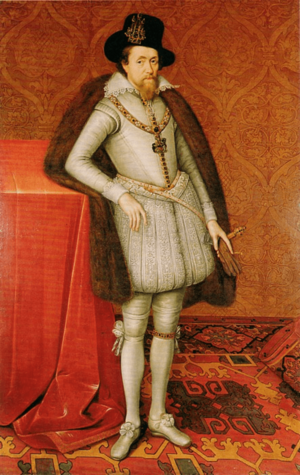Great Contract facts for kids
The Great Contract was an important plan in 1610 during the time of King James I in England. It was suggested by Robert Cecil, a key advisor to the King. The main goal of this plan was to help the King get more money and pay off his debts.
Contents
What Was the Great Contract?
The Great Contract was a deal proposed to King James I and the Parliament. Robert Cecil suggested that the King should give up some old rights. These rights were called feudal rights. In return, Parliament would give the King a fixed amount of money each year.
Old Feudal Rights
The King had special rights from a long time ago. These included:
- Wardship: This meant the King could control the land and money of young nobles if their fathers died. He could also arrange their marriages.
- Purveyance: This allowed the King to buy supplies for his household at lower prices. He could also demand transport for his goods.
- Impositions: These were special taxes the King could create without Parliament's approval.
Cecil thought giving up these rights would make Parliament happy. It would also give the King a steady income. He suggested an annual payment of £200,000 to the King. This money would help the King manage his finances better.
Why the Plan Failed
The Great Contract seemed like a good idea at first. However, both the King and Parliament eventually decided against it.
Parliament's Concerns
Members of Parliament did not like the idea of permanent taxes. They especially worried about giving a lot of money to King James. He was known for spending money freely. They feared that if the King had a lot of money, he would not need Parliament's help. This would give him too much power. Even though they first accepted the idea, their voters back home were strongly against it.
King James's Concerns
King James also changed his mind. He realized that giving up his feudal rights meant losing control. These rights were a way for him to influence powerful people in his kingdom. He also felt that £200,000 a year was not enough money. He thought his old rights were worth more.
Because both sides pulled out, the Great Contract failed. Some people believed this failure made Robert Cecil's health worse, leading to his death in 1612. However, he most likely died from cancer.
Financial Challenges of the Crown
The failure of the Great Contract left the King with his money problems. It is still debated if the contract would have truly fixed the financial situation.
King James's Spending
King James I did spend a lot of money. He had a wife and four children to support by 1605. This meant he had many real expenses. However, the Crown was already in debt when he became King. When Queen Elizabeth I died, the Crown owed £400,000. Queen Elizabeth was known for being careful with money. This shows that the financial problems were not all King James's fault.
The Great Contract was an attempt to solve these money issues. Its failure meant the King and Parliament continued to struggle over finances for many years.
Images for kids



